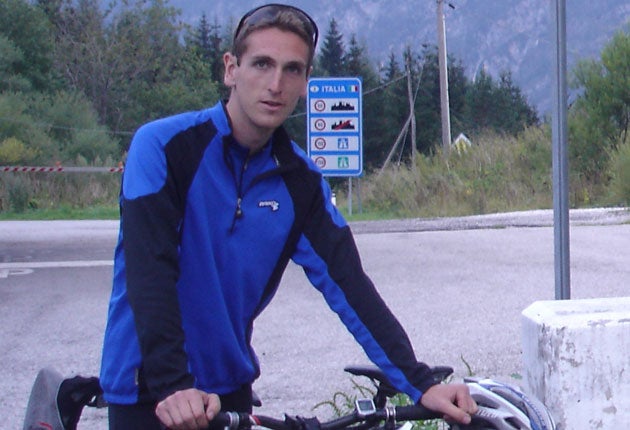Cyclists 'left unprotected by police and courts'
Drivers who claim they couldn't see bikes are too often believed, say campaigners

Your support helps us to tell the story
From reproductive rights to climate change to Big Tech, The Independent is on the ground when the story is developing. Whether it's investigating the financials of Elon Musk's pro-Trump PAC or producing our latest documentary, 'The A Word', which shines a light on the American women fighting for reproductive rights, we know how important it is to parse out the facts from the messaging.
At such a critical moment in US history, we need reporters on the ground. Your donation allows us to keep sending journalists to speak to both sides of the story.
The Independent is trusted by Americans across the entire political spectrum. And unlike many other quality news outlets, we choose not to lock Americans out of our reporting and analysis with paywalls. We believe quality journalism should be available to everyone, paid for by those who can afford it.
Your support makes all the difference.Greater protection for cyclists on Britain's roads is being demanded after a former British heavyweight boxing champion was killed on his bicycle last week. Gary Mason, 48, died after a collision with a van while cycling in Wallington, south London. He is the second cyclist to die in the UK this year.
One leading barrister has criticised police, judges and prosecutors for failing to give greater legal safeguards to cyclists. Martin Porter QC said prosecutors need to be "more imaginative" when it comes to charging drivers involved in fatal and near-fatal accidents.
Mr Porter said: "The excuses of not seeing cyclists seem to be too readily accepted by the police and the CPS so there isn't a prosecution when there should be. Judges should be handing down stiffer sentences and prosecutors should be more ambitious in the choice of charges and the decision to prosecute," he said yesterday.
"It's up to a judge and a jury to accept whether an excuse is good enough. It is not good enough to go into a space not knowing what is there. It's all part of the car culture that doesn't expect the motorist to foresee that the road might be occupied by a cyclist. That needs to change."
The most recent Department for Transport (DfT) statistics show that the number of those hurt, as a proportion of total miles cycled, went up by 1 per cent between 2008 and 2009. The total number of casualties rose 5 per cent in the same period. While deaths dropped from 115 to 105 in 2008-09, cyclists seriously injured rose from 2,450 to 2,606.
The UK's national cyclists' organisation, the Cyclists' Touring Club (CTC), said that more protection was necessary if the increase in people using two wheels since 1994, when casualty records began, is to be continued.
Debra Rolfe, the campaign co-ordinator for CTC, said: "We don't think the law does enough to protect cyclists. There are a lot of areas where the law frequently does let down cyclists – whether at the level of the police failing to collect enough evidence to the CPS not prosecuting or the courts often convicting to a lesser offence.
"This needs to change because it's becoming clear that cycling is the answer to many of society's ills – whether that be climate change, obesity or improving busy roads. Cyclists need to be treated like they belong on the roads."
Mr Porter, himself a cyclist, was recently assaulted while on his bike by a motorist and threatened by another. He said he believed that some judges are frustrated by a lack of sentencing power when they are dealing with motorists.
"One judge was frustrated by the limit of two years as a maximum sentence for dangerous driving in the case where a motorist had deliberately driven into a cyclist," said Mr Porter. "Prosecutors could have been more imaginative in the charges they have brought because they could have prosecuted for assault occasioning actual bodily harm, in which case the judge would have had the ability to sentence for up to five years rather than up to two years for dangerous driving."
Eilidh Cairns was crushed by a lorry in Notting Hill, west London, while cycling to work in February last year. The driver subsequently pleaded guilty to having defective eyesight. He was fined just £200 and given three points on his licence.
Emma Chesterman, a friend of Ms Cairns, said: "He admitted his eyesight was not good enough and gets £200 and three points on his licence. It does not seem fair. We are bewildered by the whole system that treats cyclists' deaths in this way. It seems to be the attitude that you are putting yourself in the way of danger and therefore it is your own fault if it happens to you, which is not the same as if it were a pedestrian killed."
The Department for Transport denied that cyclists are insufficiently protected. "We take road safety extremely seriously and are working to improve safety for cyclists in a number of ways. The number of cyclists killed or seriously injured on the roads each year has fallen by 31 per cent since the mid-1990s. We are investing in the provision of cycle training and planning to encourage local authorities to introduce more 20 mph zones in residential areas and around schools."
Join our commenting forum
Join thought-provoking conversations, follow other Independent readers and see their replies
Comments